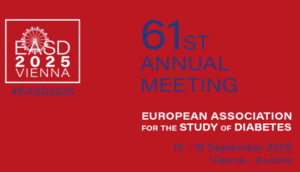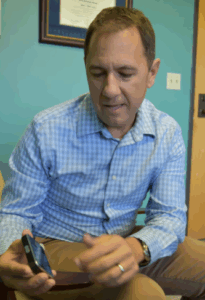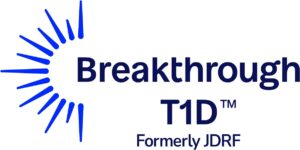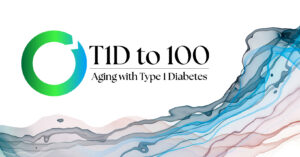In this week’s issue of The Savvy Diabetic:
-
-
- Takeaways: European Association for the Study of Diabetes 2025
- New Frontiers in Diabetes Care Revealed, EASD 2025
- Breakthrough T1D& T1Dto100.com on T1D & Aging, 1 October, 12 pm PT / 3 pm ET
- top Calling T1D a “Disease” by Mark Heyman, PhD, T1D
-
Takeaways from the European Association for the Study of Diabetes (EASD) annual meeting, 2025. I must comment that I don’t see much that we haven’t already shared from the annual ADA conference in June 2025 and the ADCES annual conference in August 2025.
 Spotlight on beta cell replacement therapies: Several beta cell replacement therapies were discussed at EASD, ranging from early-stage investigations to human research trials.
Spotlight on beta cell replacement therapies: Several beta cell replacement therapies were discussed at EASD, ranging from early-stage investigations to human research trials.
-
-
-
- The trial, which is furthest along, involves a product called Zimislecel, for which published data at the time of reporting showed that out of 12 participants, ten remained free from the need to inject insulin for a year. Vertex is recruiting new participants,
- Adocia – France presented pre-clinical data on a product called AdoShell, an implantable device that contains insulin-producing beta cells and does not require immune suppression.
- Allarta, funded by Breakthrough T1D, also presented pre-clinical data regarding implanted immune-evasive solutions that have the potential to replace insulin for people with type 1 diabetes (T1D).
- In Kyoto, Japan, researchers have been developing a novel method to grow beta cells in the laboratory, aiming to replicate the structure of beta cells when they are implanted into people with type 1 diabetes (T1D).
-
-
Early detection and beta cell protection:
-
-
-
- The ELSA study is currently being conducted in individuals aged 3-13 to screen for early-stage Type 1 Diabetes (T1D) and identify the presence of autoantibodies in their blood.
- Therapies to extend the time in early-stage T1D, where no insulin therapy is required, are referred to as disease-modifying therapies. Teplizumab is a therapy that can delay the onset for up to two years and was recently approved by the MHRA.
- A therapy commonly used in organ transplants, called Anti-Thymocyte Globulin (ATG), is a means to preserve beta-cell function. Results show that even at low doses, there were signs of C-peptide.
- Another approved therapy (baricitinib) was shown to be the first oral disease-modifying therapy, with data showing that when the treatment was stopped, the progression of T1D was observed. These results support that baricitinib can delay the onset of T1D. As both ATG and baricitinib are already approved for use outside of T1D, they could be a cost-effective and easily accessible treatment for early-stage T1D.
-
-
Smart Insulin: Dr. Nicholas Hunt, of the University of Sydney, presented Initial results showing a dose-dependent effect in various animal models, which had a low risk of low blood glucose (hypoglycemia). Dr. Matt Webber has recently been investigating smart insulins that work faster and respond more quickly to glucose levels. These insulins would form ‘depots’ under the skin and would be soluble in the presence of glucose.
Diversity and inclusion in T1D clinical trials: Data were presented to highlight the lack of diversity and inclusion in T1D trials worldwide.
New diabetes distress guidelines launched: Professors Richard Holt and Jane Speight presented the first-ever EASD guidelines on diabetes distress. Three years ago, the EASD board committed to developing clinical practice guidelines in this area, recognising just how much of a toll diabetes distress can take on people living with the condition.
Advances in T1D technology:
-
-
-
- Abbott Laboratories presented new research into their continuous ketone monitor (CKM), which will be integrated into their continuous glucose monitor (CGM) models.
- AccuCheck presented data on a predictive CGM model. This means that the CGM can estimate your future blood glucose levels (up to two hours) and work in conjunction with an insulin pump to adjust them accordingly. It also has a low glucose prediction and a nighttime low prediction function.
-
-
Read more: Six key things to take from EASD 2025 conference
New Frontiers in Diabetes Care Revealed by Justine Evans for DiabetesVoice.org and the International Diabetes Federation. 24 September 2025.
 The recent 2025 Annual Meeting of the European Association for the Study of Diabetes (EASD), held in Vienna, Austria, from September 19 to 22, highlighted breakthroughs that could transform the management of diabetes and its complications worldwide. Over four days, researchers presented findings that point to earlier, smarter, and more personalised care—especially for those at higher risk of cardiovascular and kidney disease.
The recent 2025 Annual Meeting of the European Association for the Study of Diabetes (EASD), held in Vienna, Austria, from September 19 to 22, highlighted breakthroughs that could transform the management of diabetes and its complications worldwide. Over four days, researchers presented findings that point to earlier, smarter, and more personalised care—especially for those at higher risk of cardiovascular and kidney disease.
-
-
-
- EASD announced the launch of its first-ever clinical practice guideline, the world’s first to focus on diabetes distress. By recognising the emotional burden of diabetes as a core part of care, the EASD guideline marks an important milestone in advancing person-centred, holistic diabetes care across Europe and beyond.
- Studies on semaglutide (GLP-1 receptor agonists) continue to demonstrate that semaglutide reduced major adverse limb events by 30% in people with type 2 diabetes. This result builds on its well-established cardiovascular benefits. In the SOUL trial, oral semaglutide also significantly reduced the risk of heart failure or cardiovascular death.
- The results of the CONFIDENCE trial, which investigated the effects of initiating finerenone and empagliflozin together in individuals with diabetes and kidney disease, revealed that this combination improved health outcomes, including a reduction in albuminuria—a marker of kidney damage.
-
-
Read more: EASD 2025: New frontiers in diabetes care revealed
Breakthrough T1D Upcoming E-Meet & Greet for Adults living with T1D, About T1D and Aging, with Jennifer Pliner for BreakthroughT1D.org, 1 October 2025.
Breakthrough T1D – Northern California is hosting its upcoming E-Meet & Greet for Adults living with T1D on Wednesday, October 1, 12 pm PT / 3 pm ET.
“We will begin our session with Joanne Milo, who will lead a discussion on T1D to 100! T1D to 100 is a new space created by and for people with Type 1 diabetes who are navigating the realities of aging—seeking support, sharing insights, using tools to feel more prepared, and living well. Jeannie Hickey, CDCES, will be joining Joanne in this program.”
For Zoom link, please contact Jennifer Pliner: JPliner@BreakthroughT1D.org
Stop Calling T1D a “Disease” by Mark Heyman, PhD, T1D for TheDiabetesPsychologist.com, 21 September 2025.
 Mark Heyman, PhD, known as “The Diabetes Psychologist,” has lived with Type 1 Diabetes (T1D) since 1999. “In the years following my diagnosis, I searched for information and tools to help me deal with the emotional roller coaster of life with T1D, and I always came up short. So, I decided to become a diabetes psychologist and create the resources and tools that would have been so helpful to me.”
Mark Heyman, PhD, known as “The Diabetes Psychologist,” has lived with Type 1 Diabetes (T1D) since 1999. “In the years following my diagnosis, I searched for information and tools to help me deal with the emotional roller coaster of life with T1D, and I always came up short. So, I decided to become a diabetes psychologist and create the resources and tools that would have been so helpful to me.”




I think I will still call it a disease. Who can I send $200 to get some of those vertex cells?